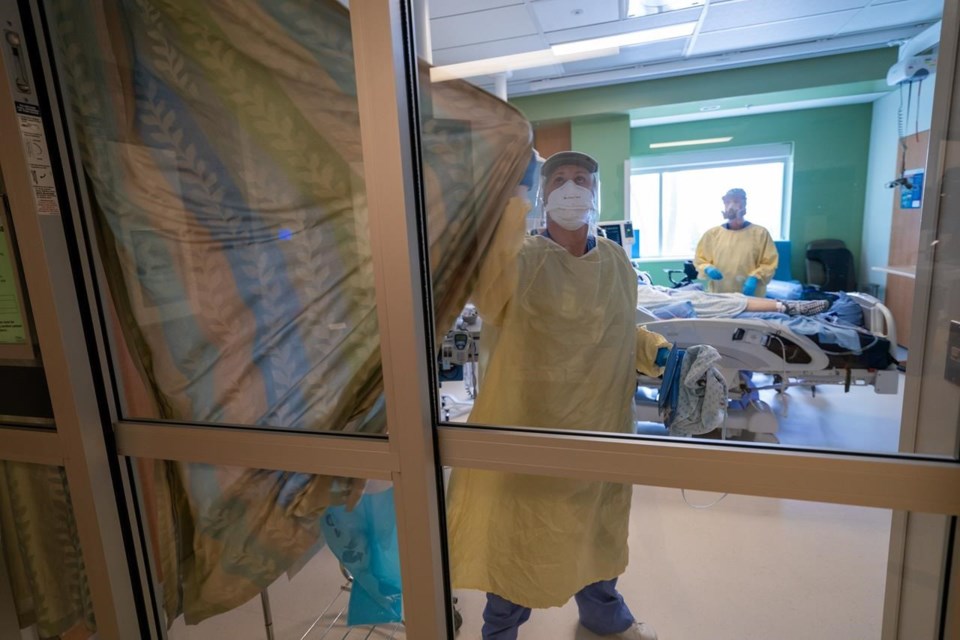VANCOUVER — A series of letters from doctors raising the alarm about the management of patient care at a Metro Vancouver hospital is placing British Columbia's largest health authority under scrutiny.
The latest open letter about Surrey Memorial Hospital came from its Medical Staff Association and said management at Fraser Health and the B.C. Health Ministry have not provided "any tangible support" for overstretched emergency-room doctors.
"Your continued silence and inaction on this issue is placing the health and well-being of Surrey residents in jeopardy," the association wrote in the letter addressed to B.C. Health Minister Adrian Dix.
The letter was shared with The Canadian Press by an association doctor on Tuesday.
"We implore you to take immediate action … and if you cannot do this the only responsible recourse is to place the Surrey Memorial Hospital ER on diversion."
In the last three weeks, doctors from different disciplines within Fraser Health have sent out at least four letters decrying what they described as a lack of doctors and hospital capacity to handle the demands of one of B.C.'s fastest-growing regions.
Surrey Memorial's emergency doctors published their own complaint letter on May 15, followed two weeks later by a letter from 36 women's health physicians at the same hospital outlining a "critical scarcity of resources" that contributed to the death of a newborn baby.
This week, a CBC report said dozens of emergency doctors from Royal Columbian Hospital in New Westminster and Eagle Ridge Hospital in Port Moody — both under Fraser Health purview — also wrote a joint letter describing similarly dire situations.
Dix said at an unrelated news conference that he met with Surrey ER and women's health physicians on Wednesday.
He said he is working on new contracts for Surrey's hospitalists — the doctors responsible for patients outside ERs — that would help address overcrowded emergency rooms.
Dix said efforts are also underway to improve services like primary and specialty care to ease the burden on Fraser Health emergency departments.
"We'll have things to report once we've come to agreement on that," Dix said. "But what I think doctors said to me specifically is they want to be involved. And I want them to be involved because at a detail level, at a patient level, they have the insights required to make the right decisions."
Dix also gave a vote of confidence towards Fraser Health CEO Victoria Lee, saying those who are calling for a change in leadership need to "take a step back."
Surrey Memorial Hospital obstetrician and gynecologist Claudine Storness-Bliss, one of the physicians who signed the letter regarding women's health, said it came as a direct response to the first letter by the hospital's emergency doctors because of how much the two situations mirrored each other.
"There's nothing in (the ER doctors') letter that is surprising to us," Storness-Bliss said. "We all know this. But I think the public doesn't know, and that was the purpose of (our) letter."
Storness-Bliss said Surrey Memorial Hospital's family birthing unit was expanded a decade ago to accommodate 4,000 deliveries every year, but the facility now handles roughly 6,000 annually.
As a result, the unit is frequently placed on diversion, in which patients are transferred to other communities in what Storness-Bliss called "a symptom of a broken system."
She said operating room wait times for gynecology services at Surrey Memorial are as much as 77 per cent longer than industry benchmarks, and all the issues are combining to worsen patient outcomes.
"If things aren't fixed, it's only a matter of time before this happens again," Storness-Bliss said, referring to the death of a newborn baby that she partially attributed to a lack of resources. "We've had countless close calls."
The letter from the Medical Staff Association says the lack of doctors in other departments is forcing ER doctors to go "well outside their scope of practice" in providing ongoing care to admitted patients, in addition to their own emergency duties.
"It should come as no surprise then to anyone paying attention that patient care is being compromised, patients are deteriorating, and the number of preventable deaths rising in our overcrowded and understaffed ER," the letter says.
The letter criticizes Fraser Health and the Ministry of Health for a lack of communication with the public about a "dire state of affairs" at Surrey Memorial in which patients have to wait for hours or even days to receive care, allowing the province to "hide" from its "culpability for the situation."
Joshua Greggain, president of Doctors of BC — which represents more than 16,000 physicians, medical residents and medial students in the province — said that while other health authorities aren't facing the same level of criticism as Fraser Health, similar labour crunches and challenges are common across B.C.
Greggain said the province isn't standing idly by, with the Family Practice Services Committee announcing on Tuesday a one-time fund of $29 million to stabilize in-patient, maternity and long-term care up to the end of 2023. The committee is a collaboration between Doctors of BC and the provincial government.
Greggain said the South Island Medical Staff Association recently wrote a letter addressing the Island Health authority on staffing challenges, but it was written in a more conversational format, which he said could be conducive to faster solutions.
"We are fully committed to a better solution," he said. "I believe wholeheartedly that the ministry and the health authorities are also committed to the same. It's just a matter of getting together … to make sure that patients get the best possible care we can offer them."
On Wednesday, the Surrey Hospital Foundation held a summit meeting of 60 stakeholders in an attempt to find solutions to the staffing and patient-care crisis, with the group saying it will produce a report outlining "priority solutions and recommended actions" at an unannounced date.
This report by The Canadian Press was first published May 31, 2023.
Chuck Chiang, The Canadian Press



